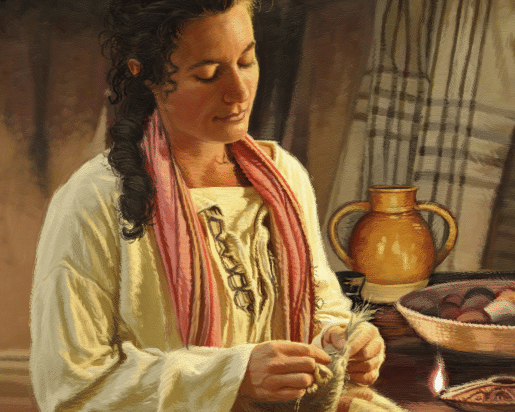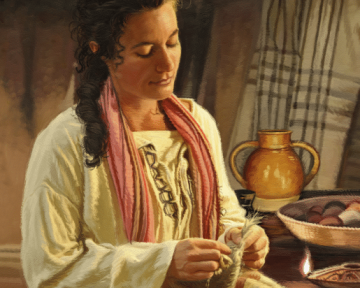Tabitha (Dorcas) “Full of good works”
In Acts 9, we read about the disciple Tabitha (her Aramaic name), who was also called Dorcas (her Greek name).
36 ¶ Now there was at Joppa a certain disciple named Tabitha, which by interpretation is called Dorcas: this awoman was full of good works and almsdeeds which she did.
Acts 9:36
- What does it mean to be “full of good works”?
- Can you think of anyone who meets this description?
Dorcas was always doing good. She is described not merely as a follower of Christ or as a believer in Christ, but as a disciple of Christ. What’s the difference? To be a disciple of Jesus the Christ means that one is a learner of His and seeks to imitate Him in words and deeds. When Jesus was here on earth, He was always doing good. Since Dorcas was a disciple of His, she imitated Him by always doing good, also… As believers in – and therefore, disciples of – Jesus the Christ, we should always be looking for opportunities to do good. And we don’t have to look far. Opportunities to do good are all around us. Doing good isn’t something that we should do occasionally. It is something that should be a daily part of our lives and of our character. Galatians 6:10 says, “Therefore, as we have opportunity, let us do good to all people.”
—Women of the Word: Dorcas, The Virtuous Girls, July 11, 2016
- How can we make doing good a daily part of our lives?
37 And it came to pass in those days, that she was sick, and died: whom when they had washed, they laid her in an upper chamber.
38 And forasmuch as Lydda was nigh to Joppa, and the disciples had heard that Peter was there, they sent unto him two men, desiring him that he would not delay to come to them.
39 Then Peter arose and went with them. When he was come, they brought him into the upper chamber: and all the widows stood by him weeping, and shewing the coats and garments which Dorcas made, while she was with them.
Acts 9:37-39
This public display of grief and gratitude suggests that Tabitha made a lasting impact on those around her and earned their love and admiration. We may not realize it, but we too are building a legacy by the choices we make each day.
—Allisa White, Women in the New Testament: Tabitha, Ensign, July 2019
- What is one thing you remember best about a beloved family member or friend, and how does that legacy affect you?
- What is one thing you would want your posterity to remember you for?
I hope that these women also expressed their appreciation to Tabitha while she was still alive. Sewing is an example of a type of labor that is often seen as “women’s work.” Too often, women’s labor, like Tabitha’s, is unacknowledged and undervalued by our societies. However, this is exactly the kind of work that Christ encouraged of everyone to do, whether male or female.
34 Then shall the King say unto them on his aright hand, Come, ye bblessed of my Father, cinherit the dkingdom prepared for you from the foundation of the world:
35 For I was an ahungred, and ye bgave me meat: I was thirsty, and ye gave me drink: I was a cstranger, and ye took me in:
36 Naked, and ye clothed me: I was sick, and ye avisited me: I was in bprison, and ye came unto me.
37 Then shall the righteous answer him, saying, Lord, when saw we thee an hungred, and fed thee? or thirsty, and gave thee drink?
38 When saw we thee a stranger, and took thee in? or naked, and clothed thee?
39 Or when saw we thee asick, or in prison, and came unto thee?
40 And the King shall answer and say unto them, Verily I say unto you, Inasmuch as ye have adone it unto one of the bleast of these my cbrethren, ye have done it unto me.
Matthew 25:34-40
Seeking to emulate Tabitha (Dorcas), in more recent history, women have formed “Dorcas Societies” to meet the need for textiles such as blankets and clothing in their communities. Here is an example of a Dorcas Society established by Black women in New York in the 1820s.
These women met weekly to mend donated clothing and create garments for both male and female students that attended the New York African Free Schools (NYAFS). While they sewed, they read abolitionist literature, which demonstrates their alignment with the work of the Colored Conventions, abolition movement, and other community activism groups. …Like many women’s groups of the time, the work of the Dorcas Society reveals how essential women were to the continued operation of schools for Black children and for promoting a positive sense of self that comes from attending school. These women’s work was integral to the successes of the children of NYAFS and to their community at large. The work of the Dorcas Society directly contributed to the moral and intellectual wealth of their communities and promoted positive racial futurity. The importance of the Dorcas Society was emphasized repeatedly in both the Liberator and Freedom’s Journal, exalting the Dorcas Society for its benevolence, good works, perseverance, and importance in keeping Black children of New York educated.
Dorcas Society, Colored Conventions Project
- How might we emulate Tabitha’s example?
When Tabitha’s loved ones found out that the Apostle Peter was staying in the nearby town of Lydda, they asked him to “come to them” in their time of mourning (Acts 9:38). Rather than just comfort these people, Peter turned their sorrow to joy when he raised Tabitha from the dead, telling her, “Arise” (Acts 9:40).
—Allisa White, Women in the New Testament: Tabitha, Ensign, July 2019
40 But Peter put them all forth, and kneeled down, and prayed; and turning him to the body said, Tabitha, aarise. And she opened her eyes: and when she saw Peter, she sat up.
41 And he gave her his hand, and lifted her up, and when he had called the asaints and widows, presented her balive.
42 And it was known throughout all Joppa; and many believed in the Lord.
Acts 9:40-42
- How was Tabitha was an instrument in God’s hands?
- What inspires you about her example?
Saul (Paul) “A chosen vessel”
At the beginning of Acts 9, we see Saul, who would later change his name to Paul, traveling to complete a villainous mission.
1 And Saul, yet breathing out athreatenings and slaughter against the disciples of the Lord, went unto the high priest,
2 And desired of him aletters to Damascus to the synagogues, that if he found any of this way, whether they were men or women, he might bring them bound unto Jerusalem.
Acts 9:1-2
Watch this video which shows the dramatic conversion story of Saul.
Notice the way Jesus introduced himself to Paul. This is probably not the kind of introduction most of us would like to receive upon meeting our Lord.
3 And as he journeyed, he came near Damascus: and suddenly there shined round about him a alight from heaven:
4 And he afell to the earth, and heard a voice saying unto him, bSaul, Saul, why persecutest thou me?
5 And he said, Who art thou, Lord? And the Lord said, I am aJesus whom thou persecutest: it is hard for thee to bkick against the pricks.
Acts 9:3-5
A prick was a sharp spear used to drive animals. Often the animals would kick back when pricked, which would cause the spear to sink even further into the animal’s flesh.
—New Testament Come Follow Me for Individuals and Families, Acts 6-9
- How might this analogy sometimes apply to us?
- What can we do to better accept correction from the Lord?
6 And he trembling and astonished said, Lord, awhat wilt thou have me to do? And the Lord said unto him, Arise, and go into the city, and it shall be told thee what thou must do.
7 aAnd the men which journeyed with him stood speechless, hearing a bvoice, but seeing cno man.
8 And Saul arose from the earth; and when his eyes were opened, he saw no man: but they led him by the hand, and brought him into Damascus.
9 And he was three days without sight, and neither did eat nor drink.
10 ¶ And there was a certain disciple at Damascus, named aAnanias; and to him said the Lord in a bvision, Ananias. And he said, Behold, I am here, Lord.
11 And the Lord said unto him, Arise, and go into the street which is called Straight, and inquire in the house of Judas for one called Saul, of Tarsus: for, behold, he prayeth,
12 And hath seen in a vision a man named Ananias coming in, and putting his hand on him, that he might receive his sight.
Acts 9:7-12
We know how this story ends. Saul becomes Paul, one of the greatest missionaries and apostles of all time, and the author (or at least, the attributed author) of 13 books of the New Testament.
But Ananias is not privy to this hindsight, and the Lord’s call for him to assist Saul confuses him.
13 Then Ananias answered, Lord, I have heard by many of this man, how much aevil he hath done to thy saints at Jerusalem:
14 And here he hath authority from the chief priests to bind all that call on thy name.
15 But the Lord said unto him, Go thy way: for he is a achosen vessel unto me, to bbear my cname before the dGentiles, and ekings, and the children of Israel:
16 For I will shew him how great things he must asuffer for my name’s sake.
Acts 9:13-16
When we talk about the omniscience of Christ, we think about things on the grand scale of the cosmos. But notice how vast Christ’s perspective is on one human soul. Christ sees Paul’s terrible behavior and calls him out on it, and at the same time, sees his (deeply dormant) goodness and identifies him as “a chosen vessel.” Christ has the capacity to look at a person in the midst of their worst sins and not lose sight of the great person they really are.
- How can we emulate the perspective of Jesus when we are tempted to judge or condemn other people?
- How can we emulate the perspective of Jesus when we are frustrated with our own selves?
Ananias restores Saul’s sight with a blessing. After spending a short interval getting baptized and learning from the Christian disciples in Damascus, Saul begins his mission. (Acts 9:17-19)
Invite class to silently read Acts 9:20-31, looking for answers to these questions:
- How did Saul’s status as a converted sinner hinder or help his mission?
- How can we be open to unexpected messengers of the Lord in our lives?
20 And straightway he preached Christ in the synagogues, that he is the Son of God.
21 But all that heard him were amazed, and said; Is not this he that adestroyed them which called on this name in Jerusalem, and came hither for that intent, that he might bring them bbound unto the chief priests?
22 But Saul increased the more in strength, and confounded the Jews which dwelt at Damascus, proving that this is very Christ.
23 ¶ And after that many days were fulfilled, the Jews took counsel to akill him:
24 But their alaying await was known of Saul. And they watched the gates day and night to kill him.
25 Then the disciples took him by night, and let him down by the wall in a abasket.
26 And when Saul was come to aJerusalem, he assayed to join himself to the disciples: but they were all afraid of him, and believed not that he was a disciple.
27 But Barnabas took him, and brought him to the apostles, and declared unto them how he had aseen the Lord in the way, and that he had spoken to him, and how he had preached boldly at Damascus in the name of Jesus.
28 And he was with them coming in and going out at Jerusalem.
29 And he spake boldly in the name of the Lord Jesus, and adisputed against the Grecians: but they went about to slay him.
30 Which when the brethren knew, they brought him down to Cæsarea, and sent him forth to Tarsus.
31 Then had the churches rest throughout all Judæa and Galilee and Samaria, and were aedified; and walking in the fear of the Lord, and in the bcomfort of the Holy Ghost, were multiplied.
Acts 9:20-31
Sarah Fariash, of the Catholic Women’s Ordination Conference, shares some things she has learned from Paul’s conversion story and how she has applied them to her own mission in life:
(1) Paul isn’t who anyone expected to be the mouthpiece of Christ. While women may not be killing or imprisoning modern-day Catholics, they are the last people the institutional church expects to be called to ministry. This didn’t stop God from calling Paul, though, and it hasn’t stopped God from calling woman after woman to lead and share Divine Love with the world.
(2) Paul himself is confused about being chosen to be Christ’s mouthpiece. He is asked to make a 180 on his views of Jesus and those who follow him. This kind of perspective shift is hard work. Paul had to completely re-envision who he was in relation to himself, to others, and to God. This is an accessible feeling for women finding themselves called to ordained life. The church has made no space for this kind of experience and so when it happens it can be bewildering. Like Paul, women called to ordination have to re-envision who they are internally, how this shifts the way others view them, and how God views them and then they have to make the scary choice to act on this. The fact that this hard work got done with Paul and continues to be done with women around the world is evidence of the Spirit at work. It’s just too hard to do alone.
(3) In spite of arguably justified suspicion on the part of Peter and the other apostles, Paul does what he knows God has called him to do and it changes the shape of the world. Paul claims apostleship for himself despite not being among the twelve during Jesus’ life. This opens a whole new meaning for the word apostle to be defined as any who have encountered the risen Christ in any of Christ’s many forms. Women are doing this now. They are claiming apostleship for themselves and doing the ministries God has called them to do in the here and now. They are bringing the sacraments to those hurting at the edges of the church both physically as in the case of remote regions and emotionally as in the case of those unable to come to terms with what they see or have experienced at the hands of the institutional church. Like Paul, women must chase their calling through the suspicion and doubt of those around them. And they do. And it is changing the world.
Sarah Fariash, St. Paul’s Conversion, and Our Own, The Table, January 25, 2020
- What are some things you have learned from Paul’s conversion story?
- How will you apply these lessons in your life?





